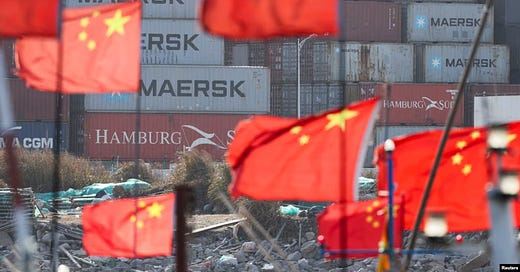"Caught between a rock and a hard place" — Phrase of the Week
Chinese exporters watch and wait as tariffs take effect
Our phrase of the week is: "caught between a rock and a hard place" (进退两难 jìn tuì liǎng nán)
Context
In the wake of the escalating tariff war between the US and China, there are stories of businesses across China already feeling the pain.
The prevailing mood among China’s exporters is one of “resignation” (无奈), and to “wait and see” (观望).
One media outlet, LatePost (晚点), has interviewed entrepreneurs who export to the US, across a range of industries at different points in the supply chain—all private businesses, many still run by the founders who started from nothing.
One entrepreneur interviewed is Cheng Ning (程宁), a former English teacher who started his own business in 2015 exporting low-cost tableware and home goods. The US makes up 80% of his sales.
For Cheng, when tariffs first rose to 20% earlier this year, he was able to negotiate with his U.S. buyers, who agreed to absorb by the additional cost, and then passed it on to American consumers.
But at 54%, the costs were too steep. His buyers pushed him to lower prices.
At 125%, he was out of options. Customers who were ready to order began to stall.
Cheng is worried:
“This is the biggest challenge I’ve faced since starting my business.”
这是我做生意以来碰到过的最大挑战
zhè shì wǒ zuò shēngyi yǐlái pèngdao guò de zuìdà tiǎozhàn
Still, like many entrepreneurs, he’s trying to be optimistic. In his view, the high tariffs won’t last. He reckons three to six months is how long it will take until China and the US return to the negotiating table.
LatePost summed up this dilemma, and many like his, with an old idiom:
Trading companies are caught between a rock and a hard place. All they can do is to wait.
贸易公司:进退两难,唯有等待。
màoyì gōngsī: jìn tuì liǎng nán, wéi yǒu děng dài.
And with that, we have our Sinica Phrase of the Week!
What it means
"Caught between a rock and a hard place" (进退两难 jìn tuì liǎng nán) is an old idiom which directly translates as "advance" (进 jìn), "retreat" (退 tuì), "both" (两 liǎng), and "difficult" (难 nán).
Put together, it can be translated as "both advancing and retreating are difficult."
The phrase first appears in the military text, Weigong Bingfa (卫公兵法), attributed to the Tang dynasty general, Li Jing (李靖).
An early form of the idiom appears in this passage:
"For soldiers attacking a city... advancing or retreating is equally hard: if they advance, they cannot breach the walls ahead, but if they retreat, they will be pursued from behind."
凡攻城之兵……进退又难,前既不得上城,退则其师逼追。
fán gōngchéng zhī bīng... jìn tuì yòu nán, qián jì bùdé shàng chéng, tuì zé qí shī bī zhuī
Weigong Bingfa (卫公兵法), often translated as The Military Strategies of the Duke of Wei, is a classic treatise on military tactics, offering advice to rulers and commanders on how to wage war and defend territory.
It’s author, Li Jing (李靖), was a renowned military strategist who lived during the early Tang dynasty (618–907 CE). His military achievements earned him the noble title Wei Gong (卫公), or "Duke of Wei"—the namesake of the text.
In its original context, the idiom described the kind of deadlock soldiers faced during a siege, trapped between fortified defenses ahead, and danger behind, with no good options in sight.
Over the centuries the idiom moved from the battlefield into normal life, and evolved into its current form: "both advancing and retreating are difficult" (进退两难).
It describes an impossible dilemma, and tends to be translated to the equivalent English idiom, "caught between a rock and a hard place".
The phrase couldn’t be more fitting for many Chinese export businesses considering what to do next.
Move forward by absorbing the high costs and risk selling at a loss; step back altogether and risk losing long-standing American clients.
The only option right now is to wait.
Andrew Methven is the author of RealTime Mandarin, a resource which helps you bridge the gap to real-world fluency in Mandarin, stay informed about China, and communicate with confidence—all through weekly immersion in real news. Subscribe for free here.
Read more about how this story is being discussed in the Chinese media in this week’s RealTime Mandarin.






